![]()
The Words of the Yun Family
|
|
The Words of the Yun Family |
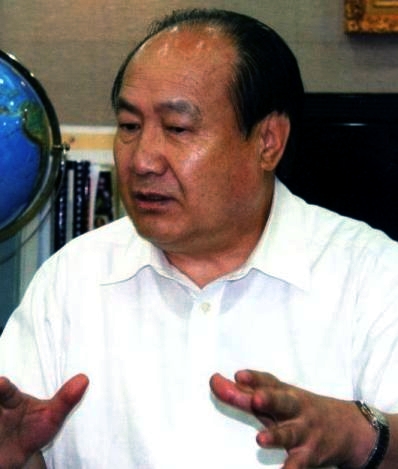
I would like to first describe the background of the peace ambassadors' movement. Father, for a very long time, spoke about educating the top leaders in society. I used to be the leader of the training center in Jardim, Brazil. Once I finished my mission there, Father brought me back to Korea. I started researching how to reach out to societal figures. Father kept mentioning that he wanted a political party that could educate people. I realized, after researching methods of approaching people, that many limits existed. We could not educate people through a party; our constitution did not allow that. Even if we did set up a political party, we could only educate people that were members of the party. Considering all of this, I told Father that we could not educate the Korean people through a political party. Educating people through other means would be best. Once we had talented people from these educational sessions, we might set up a party that had people talented enough to become parliament members. Father accepted what I said.
The first thing I did was to start educating top leaders, such as members of parliament, through the Inter-religious and International Federation for World Peace (IIFWP). We did that for two or three years. We started the Japanese excursions for high-level contacts.... The best way to approach them and to help them understand the greatness of Father and True Parents was to teach them the Divine Principle. That was the motivation for the Japanese junkets for Korean social leaders.
Later, Father said that we needed a term, an official term, that we could call the graduates. Father said we could use any term with the word "peace" in it. I tried to think of a good term but I could not come up with a good enough name. Father came up with the term "peace ambassador." I said, Father, an ambassador is a term given by presidents that appoint people qualified for the position of ambassador. Father said, Wait! I am better than a president. Presidents are fake. I am the real leader. That is how we began appointing peace ambassadors.
After conducting the peace ambassadors' movement for two or three years through the inter-religious federation, the name changed to UPF.
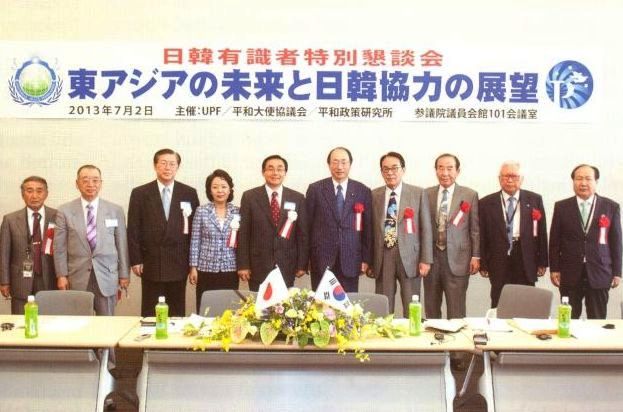
Working to Undo Our Image Problems
Intellectuals and top people in society had a very strong negative bias about our church. For them, we were a worthless religion that no one needed to treat well or even to relate to. It was a weird cult that had to be ignored. That was how bad their view of the Unification Church was. Because as members we live among ourselves without much outside contact, I was unaware of how society viewed our church. Only through my participation in overseas junkets, workshops in Japan for Korean intellectuals, did I realize that this negative view existed.
In the midst of this existing bias, we decided to approach some of the top intellectuals, which included university deans and ex-National Assembly members; that is, former legislators. We tried to approach every single one of them, and we provided everything, including accommodations and airfare. For the first sessions, these opinion leaders only agreed to come because we provided everything, but what they heard genuinely moved them. Once they saw the true face of the Unification Church, they realized that the biases they had held came from rumors, nothing but rumors. When Father heard about the effect these workshops were having on people of significance, he began to give his full support. He told us that this is what education is supposed to do. It is supposed to change people. He encouraged us and had more interest in the peace ambassadors' mission. What 1 want to emphasize is that no one, not even Father, began this program with the idea that we needed to educate thirty thousand people or fifty thousand people. After seeing the effect, we began to carry it out in earnest.
We even published a book that compiled all the reflections of the peace ambassadors on what they felt about the church before the education and after. We could not include everything. Most of material covered the jobs and positions that the peace ambassadors held in society and what kind of biases they had held before they began to see Father in a different light, respect his work and desire to support and join this peace movement. Among the many reflections by peace ambassadors, one is exceptional. A man that had been the MBC news anchor for twenty years wrote a chapter in his autobiography about Father and Father's activities. In the beginning, he had not intended to, but when he heard of Father's ascension, he felt he had to. He began by explaining the many prejudices people have about our church and stories of members having to give all their fortune to the church, people being forcefully married to foreigners, and Father calling himself the messiah but being a cult leader. The point was that people say the Unification Church is a scary place and no one should go there. That is how strong the bias against us has been in Korean society. One day he somehow became connected to one of these educational sessions. He thought, Well everything is free. I can go there and play some golf. He went with such a light heart but later realized, oh, it was not what I expected; it was significant.
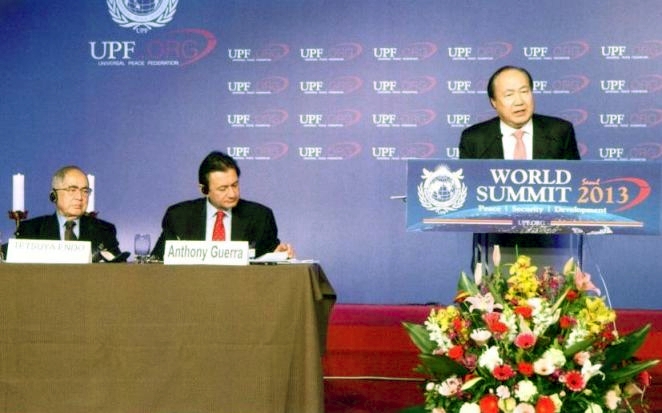
We stumble but recover
There is nothing wrong with Father's ideal that prominent people have to be educated, but when we tried to gain their help in engaging the Korean public in a way that might have broadcast a better understanding of our movement on a larger scale, we misunderstood the position we were putting the ambassadors for peace in. We had not considered that they had existing ties that they had cultivated over years or decades and joining with us in a public endeavor that they had traditionally undertaken with other groups put them in an untenable situation. We had not considered that they could support us only by rejecting older friends and supporters.
Our approach ignored the reality. Following that brief debacle, Father took the Inter-religious and International Federation for World Peace and renamed it the Universal Peace Federation (UPF) and unofficially, the Abel UN. The motive was to complete what Cain could not accomplish. Looking Toward the Future
Nowadays, I am focusing on the pure motive behind the founding of UPF, which is a peace movement and on the pure spirit of the founding of UPF, the educational aspect. Probably, among the different UPF organizations in the world, Korea's is the largest. Even in Japan, it is quite small. In America, it is still small. Korea is the largest because we have a network of around 34,000 peace ambassadors. Through them, we could set up an organization.
Father had this great dream of peace, and I have been working toward realizing his dream, continuously working. Since Father set up the Abel UN, Father dreamed that it be as big in significance and size as the United Nations and able to solve problems that the UN has not been able to solve. My hope, which has not yet been realized, is to have a yearly Abel UN assembly -- like the one that the United Nations holds. All peace ambassadors in Korea and throughout the world could meet and focus on the various problems that the world is facing. Even if we may not have direct influence in resolving those problems, at least to talk about them may lead to movement within the regular United Nations when Abel UN peace ambassadors discuss issues on an agenda at an annual assembly. We have not yet been able to accomplish this, which saddens me. I keep telling our peace ambassadors that the central nation in the actual UN is the United States, so Korea, which has the largest number of peace ambassadors and with Father, the founder, having been Korean, Korea should take the lead in setting up an Abel UN general assembly to solve problems related to peace in the world.
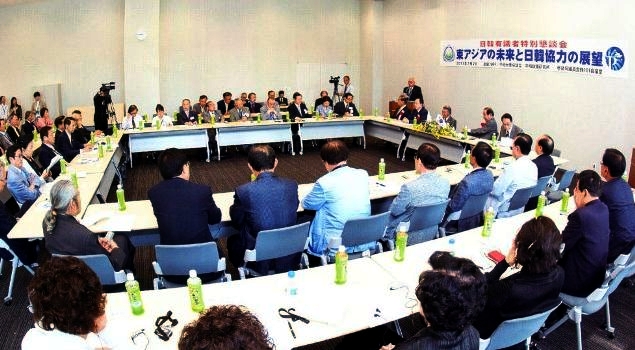
Evidence of a Sea Change
When we look at Father's Seonghwa Ceremony, we learn that we had about thirty thousand members from Korea and about thirty thousand members from Japan that came to attend the ceremony and around fifteen thousand peace ambassadors. If we had not carried out this peace movement, no one other than members would have attended Father's Seonghwa Ceremony. It would not have become a big issue at all. It would have just been a church event, one limited to church members. That is why the peace movement was necessary. The peace ambassadors, the education that brought them into contact with us and their involvement since then played a key role in changing Father's image in the world, as a peace-loving global citizen.
That is what I have been pursuing, trying to change the image people have of Father to someone who not only loves peace but who has exerted extraordinary effort to bring peace to the world. We need to show to the world that his efforts to promote peace by themselves are reasons that Father was worthy of their respect. The more they understand of him, the more their minds will change toward him.
Applying Korea's Experience Globally
To embrace the whole world, we need a central theme. Reaching the world through the blessing alone is impossible. We need a central theme and I think that central theme is the peace foundation that we have. Based on peace promotion, we have to early out activities to embrace the whole world.
To realize a peaceful world, we need politics and economy and other tools but our main purpose and goal is to achieve a world of peace. Thus, when people come together in the name of peace, whatever barriers or biases or walls that exist all fall away. Thus, our peace promotion has proved effective.
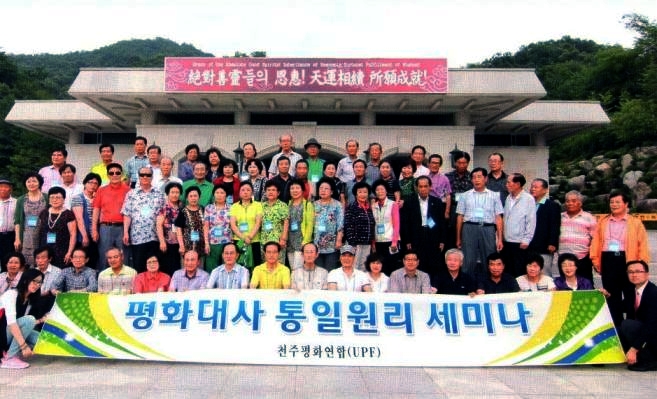
The Direct Witnessing Approach
1 have of course heard from those whose strong desire to witness calls them to begin by bringing people immediately to the Blessing Ceremony but that is not likely to happen with those in whom a negative image arises whenever they come across an activity we are involved in. Through educational sessions, the first thing we have to do is to deal with and change that negative image.
In any case, at this time I have two goals in mind that I strongly want to pursue. One is to have a global general assembly every single year. The second is through educating people to guide them so that they can respect True Parents and their ideology and teachings, so that they consider joining our church. My final goal is to lead them to participate in the Blessing Ceremony, so that they are able to receive salvation through our church and become members. Those are the two areas I am pursuing now.
Concerning Father being the returning Lord, we do not actually present that from the very first, because it would cause controversy and once they become blocked there, they couldn't move on to the next lecture.
What we focus on is filial piety, because that is closer to the Korean culture. We introduce Father as a True Parent and say that we are his children. His role as the parent is to bring peace in the world and blessings to the world. As children, we are doing whatever we can to fulfill our Father's will. We introduce Fathers' accomplishments, what he did in the world. Those are our first steps.
We do not introduce Father as the returning Lord. I have been focusing on education for a long time. I am a lecturer. The purpose of a lecturer or educator is to help people understand. Father has made many proclamations during his public speeches. It is easy to proclaim as a proclaimer but the purpose of a lecturer is to help people who listen to those proclamations understand what they mean exactly, to be able to accept them, to digest them. Otherwise, people are likely to dismiss them with derision.
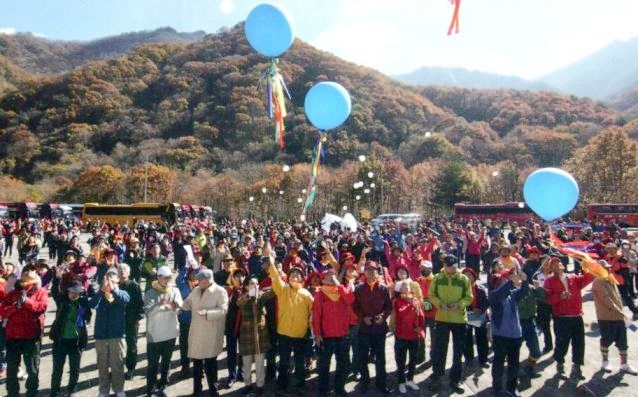
Develop a Persuasive Process
It is easy for you to say True Parents are the Messiah, but a listener has the choice to believe it or ignore it. You might proclaim it, but as an educator, I have to help those people that have listened to these proclamations to understand what they meant. That is why we need lecturers. That is why in a church you have the original text, for example, the Bible, but need a pastor to explain it, to help people understand what the Bible is about. That is why we need lectures, education, pastors and churches.
According to the chapter on Father in the news anchor's autobiography, the whole of Korea knows that the Unification Church says Father is the Messiah and that he comes in place of Jesus. The whole of Korea knows that, but they do not understand it or believe it. That is Korea's present state. What we have to do now is to educate them, reach out and persuade them to see why we believe that True Father came as the Messiah. To persuade them to believe that, we need a process that helps them digest the concepts. Some people criticize UPI: for not teaching directly that Father is the Messiah but that is not the point. The point is helping people understand. The whole purpose is to help peace ambassadors and other people understand the rationale behind True Parents being the Messiah. Bare proclamations by us that they are the Messiah are just the basis for rumors. Our job focuses on helping others understand and on persuading them, helping them see the light.
Anecdotal Evidence
You don't just start directly with True Parents being the Messiah, believe in him, because if you do that those you are trying to reach will put up walls that will never come down no matter how hard you try to tear them down. Our education head in a local branch told me about someone that members have been trying to witness to for twenty years.
He went to one of church workshops and he concluded it was just what he had expected. Then, after he became involved in our peace promotion activities, he went through some education. His first impression was that it would be the same message he had heard from the Unification Church before but after listening to it, what he heard moved him. He said that if he hadn't listened to the lectures he probably never would have respected Father or seen Father in a different light.
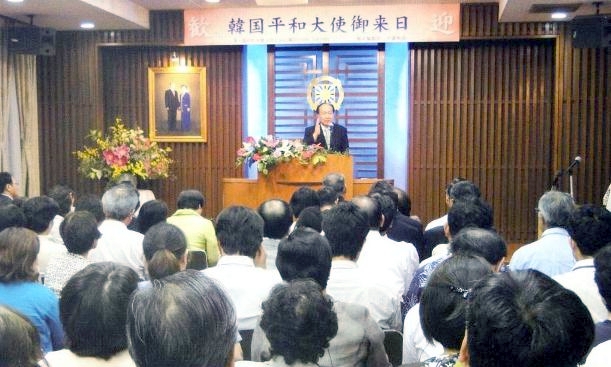
Interchurch Cooperation
The seven years we've invested in this peace work has not been to no avail. Even now, Unificationist pastors are supporting the UPF peace ambassadors movement with a bit of money or the loaning of their buses for transportation of peace ambassadors, because they recognize that once the peace ambassadors are moved they may eventually come to the church. Our church leaders have come to realize that. Looking back over these six or seven years, it has not been wasted time but it has been an educational time for everybody.
The peace ambassadors are being educated even now; a group of ninety-two is at Chung Pyung for a three-day workshop. To go in from the beginning and tell them they should attend a worship service can only lead to a dead end. People, at least people of this caliber, are unlikely to accept such direct witnessing. I have been a pastor and a regional director. I know how difficult it is to directly witness to people, but through this peace movement, people naturally want to know what Rev. Moon teaches. Through that course, they are guided naturally into Divine Principle lectures and they become very inspired to learn what Father Moon had actually taught. That is how we should guide them. We should not be looking at our church activities and the peace activities as two separate entities. They are interconnected. The peace movement can be seen as another means of witnessing in our church. I want people to take good care of peace ambassadors.
Influential Contacts Visit Japan Again
We did not just begin excursions to Japan again out of the blue. For members, Father's ascension might have caused a loss of hope, but it could also have been a turning point for us to become newly determined if we felt at Father's Seonghwa Ceremony a sense of inadequacy at not having clone enough. No matter how individual members responded, Father's passing away was likely a major issue. The peace ambassadors' response was entirely different. They respected Father for his peace activities. Once he passed away, they all wondered if the peace activities would continue now that Father is no longer alive. Mother stepped forward and told them to continue the peace ambassador activity and to restart the excursions to Japan. When peace ambassadors heard that Mother was taking the lead in conducting peace activities they were all relieved to hear the news and were happy.
Compared to past trips to Japan, we introduced major changes. In the past, the focus was to change the undesirable image people had of our church. When a person became a peace ambassador, he or she was not compelled to participate in activities, but now we teach them that peace ambassadors should be active participants in programs and projects.
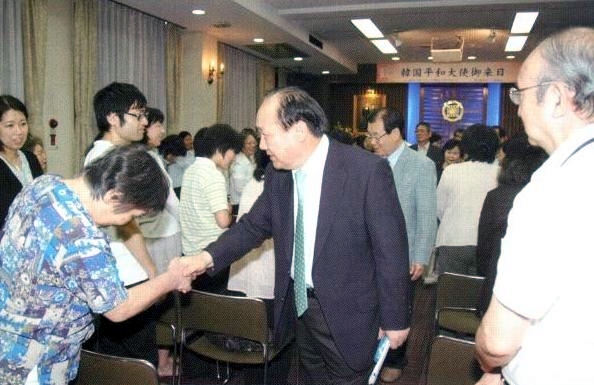
Mutually Beneficial Experiences
I also had to go to Japan, because since the past trips there, the people in charge have all changed. I had to meet them all. However, our Japanese UPF leaders were not exactly enthusiastic. They asked what the benefit for Japan was of their holding these workshops again. Korean ambassadors for peace would be educated and we would leave. In what way would Japan benefit from these activities? I accepted their point and said, Okay, let's reset this program, reestablish it in a way that it would benefit both Japan and Korea. With that, we came up with the idea of Japanese and Korean leaders visiting the Diet (that is, Japan's national legislature) and visiting our churches in Japan. Much of the money that had been spent on education of the Korean peace ambassadors had come from Japanese members. Since they had never seen the result, they wondered if they might actually have been wasting their money. This was a means of showing them some result. Through their dedication and investment, these people from a high social background in Korea had been able to be educated. When Koreans testified, they said they were very moved by this.
We broke the ambassadors for peace into groups of four. Each group was sent to ten different Japanese churches. Each church had a hundred to four hundred members waiting for them. As soon as they entered each of the churches, they were welcome with such strong applause and were given flowers. This stirred the emotions of the peace ambassadors. They felt they had done nothing to deserve such a warm welcome. The sincerity of the members likewise roused strong feelings in the peace ambassadors.
They perceived a great difference between the churches in Japan and our churches in Korea. In Korea when the peace ambassadors visited our churches, they felt no passion as if everything is dying down. They found only foreign members and elderly members in our churches in Korea. In Japan, the life in the members touched their hearts; everything moved them. Later, when the Japanese members recited the Family Pledge, the Korean peace ambassadors were deeply touched because Japan had colonized Korea. To see evidence that a Korean man had educated Japanese members and had been able to lead them providentially was a remarkable accomplishment in their eyes. They were deeply stimulated, both sides were. When they returned to Korea, the peace ambassadors wanted to go to their local churches and inspire the members. One of those peace ambassadors went straight to the regional president and said he wanted to testify about his experience in Japan at Sunday service. They took these steps voluntarily.
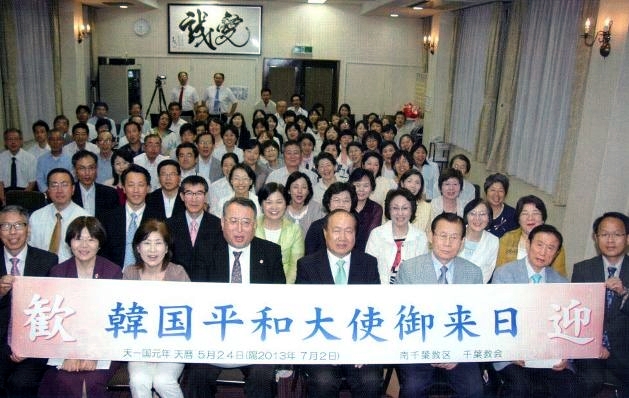
Japan's Views on Korea's Unification
You might think that Japanese citizens have little cause to support the reunification of Korea because they would prefer Korea be weak and divided,`' but this is where Father's great teachings come into play. Father always emphasized bringing down all national borders and boundaries and that we are all one family, one large family under God. When people accept that we are all one family under God, that we are all brothers and sisters, reasons no longer exist for us, as brothers and sisters, to fight. If brothers and sisters did fight, it would be an internal war. Usually, wars erupt between people that are unrelated to one another fighting. Thus, when we consider all of us to be brothers and sisters, no reason exists to fight.
We teach in Japan that being one family under God, Koreans are not just a separate group of people, they are your brothers and sisters; the pain that the Korean people are going through because of this separation is something Japanese people should be concerned about because we are siblings.
We use that approach and it makes sense because we have found that there is no other reason to care about other people.
Conclusion
I tried to show you the direction that UPF is going now. I served Father for seven years in Jardim and spoke to him often about many points, but he often emphasized two points. One was his hope to establish the Abel UN. He had originally wanted the building they were constructing on Yeouido to be the headquarters for the Abel UN. When it was taken away he was not upset about losing a building. What upset him was that the vision had collapsed. Later he said he would build a seventy-four-floor building in Yeosu to set that up as the Abel UN headquarters. That was Father's hope.
At this point, I do not think we need the building, but if people could just convene -- one thousand people to three thousand people from around the world -- with one purpose, it would be easy. Perhaps, we could invite a key figure like former president Gorbachev or ex-president Bush. They could give key lectures on what they think about peace.
Gradually, more and more would become connected. Those that do might gradually be willing to make donations. Education is the key point. People do not change when you try to educate them with mere earthly concepts. When we educate people with the Divine Principle, though, they can substantially change. My goal now is to achieve an Abel-UN general assembly and a genuine Abel UN. I am working toward that.
I hope this will motivate people and that many people will agree that this work with UPF is worth carrying out. It is important to start or realize something. It is important to dream and to plant that dream in other people. You need a foundation, but it is not good to simply speak about having a foundation. The best way to show a foundation is to call together even just a thousand people. Once people agree to meet, the government would not stop them from coming to Korea. They would have to acknowledge that we do have a foundation. For example, if we were able to call former president Gorbachev to Korea, I do not think anyone else in Korea could do that. That in itself would cause people in the government and people generally to acknowledge that we do have a strong foundation. This is my hope. I want to realize this, even though Father is not here.
About this general assembly, we should not suddenly say that we will hold it in a few weeks or a few months. We should set a date a year before the Abel-UN general assembly. In the meantime, we should inspire people because people might want to come here for this without our having to offer any financial support to come to Korea. That is what I want to do.
With ideologies, you can never win. Because of ideology some people will always say, I do not want to believe in you. You can never win over someone with ideology, only with peace efforts.
We should set up elections within our UN and really make it an Abel UN as Father wanted when he was alive. That is UPF's goal. When it comes to ideologies, it is a continuous struggle. We have to advance and approach people with actual results. A good example is with our UN general assembly, if you just have one key figure, such as Gorbachev, all the media in Korea would focus on what he is doing, what he is saying and what he is attending. Having a substantial Abel-UN general assembly would show the world that only Rev. Moon was able to achieve this and we are still working on achieving a substantial peace. The results alone would move people more than ideologies.
If only ten people came from each country, about two thousand people would come. So, it is not a matter of bringing people; it's a matter of changing our thinking. We should begin by educating many people about the Abel UN. After they have an idea of what it is, we can announce that in a year we will hold the general assembly. People would want to come, because they would possess interest in and a desire to participate in the Abel UN general assembly. Once they have come to Korea, we could disperse them all over the country to talk in each region to local authorities, with whom we already have a foundation. That would make a strong network with top leaders all over the world. When they come here, it would not be about ideology; we should transcend that. It would not be not about wars; we should transcend that and get everybody together as brothers and sisters in one family. That is my hope.
Father's goal while alive was to realize world peace. It is thus important to bring all of these people within this network to experience what it is to be brothers and sisters. My goal with all education sessions is to make every person a global citizen that loves peace. Instead of talking about it, without experiencing it... Coming to experience what one family under God is gives me substantial hope.